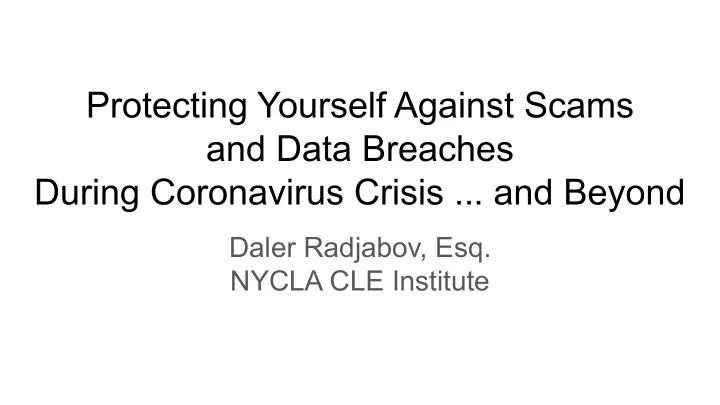

Protecting Yourself Against Scams and Data Breaches During Coronavirus Crisis ... and Beyond Daler Radjabov, Esq. NYCLA CLE Institute
Today’s topics CoronaVirus related scams ● How to secure your online identity ● How to protect your data from breaches. ● How to protect your Zoom meeting from unauthorized participants ●
CoronaVirus related scams ● Testing scams ● Treatment scams ● Supply scams ● Provider scams ● Charity scams ● Phishing scams ● App scams ● Investment scams https://www.justice.gov/usao
CoronaVirus related scams ● “Your office location is closed, please remote in today (see hyperlink).” ● “Because of COVID-19, payroll is making adjustments and we need to update account information (see hyperlink).” ● “All employees are asked to sign in (see hyperlink) and update their wellness status.” ● “Relief donations are being solicited (see hyperlink).” https://www.law.com/corpcounsel/2020/02/28/coronavirus-fraud-a-gcs-guide-to-potential-schemes/
Watch out for Phishing (vishing, smishing, spear-phishing
Do not download suspicious attachments and do not enable editing mode or macros (beware Emotet)
Watch out for Phishing (vishing, smishing, spear-phishing
How to secure your online identity ● Do not use the same password on different sites. Use Password Manager ● Limit posting personal information on social media ● Make sure websites use secure connection ● Check bank/credit card statements regularly ● Shred physical documents securely
How to protect your data from breaches. (1) do not open attachments or click links within emails from senders you don't recognize; (2) always verify the information being shared originates from a legitimate source; (3) do not provide your logins, financial data or other personal information in response to an email; and (4) visit websites by manually inputting their domains to your browser. If you believe you are the victim of an internet scam or want to report suspicious activity, please visit the FBI's Internet Crime Complaint Center at www.ic3.gov. https://www.justice.gov/usao
How to protect your data from breaches. ● Do not use the same password on different sites. Use Password Manager ● Use random password for security question ● Use ad blocker browser extension - uBlock Origin ● Use temporary email addresses for unknown sites: givmail.com ● Use 2 Factor Authentication: Authy service/app ● Do not keep important data on flash drives ● Keep software and hardware updated ● Redact electronic documents correctly, don’t just highlight with black marker
Protect from Data Breach ● Use encrypted cloud based storage ● Check that the links in emails go to the trusted sources (hover with mouse or tap and hold) ● Check that the domain of the website matches the company domain (michael.com vs micheal.com) ● Use VPN when using public internet connection ● Backup data in multiple locations and create document retention policy ● Do not keep Alexa in the office (or in line of sight)
If you think you are a victim of a scam or attempted fraud involving COVID ● Contact the National Center for Disaster Fraud Hotline at 866-720-5721 or via email at disaster@leo.gov ● Report it to the FBI at tips.fbi.gov ● If it’s a cyber-scam, submit your complaint through www.ic3.gov
If data/account was breached Check your email address: https://monitor.firefox.com/ Report identity theft: https://identitytheft.gov/Info-Lost-or-Stolen
Zoombombing or How to protect your Zoom meeting ● Do not share a meeting link in a public space ● Do not use Personal Meeting ID https://www.zoom.us
Zoombombing or How to protect your Zoom meeting ● Use Waiting Room feature ● Use end-to-end chat encryption ● Disable screen-sharing for participants.
Zoombombing or How to protect your Zoom meeting ● Lock the meeting once it has started (Manage Participants) ● Disable “Join Before Host” so people can’t cause trouble before you arrive.
Zoombombing or How to protect your Zoom meeting ● Enabling “Co-Host” so you can assign others to help moderate. ● Disable “File Transfer” so there’s no digital virus sharing.
Zoombombing or How to protect your Zoom meeting ● Disable “Allow Removed Participants to Rejoin” so booted attendees can’t slip back in.
NYCLA COVID-19 Resource Center https://www.nycla.org
Updated Notary Instructions Through April 18 https://www.governor.ny.gov/n ews/no-2027-continuing-temp orary-suspension-and-modific ation-laws-relating-disaster-em ergency
Questions? DALER RADJABOV, ESQ. EMAIL: DRADJABOV@NYCLA.ORG
Recommend
More recommend